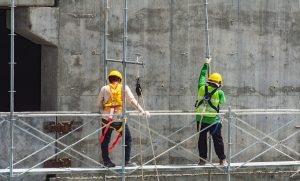Due to the nature of the construction industry, the idea of compensation is often measured in terms of an hourly wage. Even fringe benefits are equated to dollars and cents, and Davis-Bacon jobs seem to live and die by that prevailing number. However, the construction industry is changing and companies adapting to the change will lead the way in an ever-increasing labor shortage.
In a recent conversation with a client, I was asked this question: “We pay about as much as everyone else in town…why can’t we get and keep people?” If you have asked this question, you’re not alone. The labor shortage in the construction industry is a tidal wave that most of us see, some have felt, and all of us know is coming. “According to ABC, the construction industry is facing a labor shortage and must hire an additional 545,000 workers this year beyond its typical pace in order to meet expected demand. The trade association reports one in four construction workers is older than 55 and there aren’t enough younger workers to replace them.”
The tech industry is often mocked by construction, with their yoga studios and health shake bars, their ping pong tables, and couches instead of offices. And why not? I can’t begin to imagine the looks we may receive if we set up a spin class studio in the jobsite trailer. But as we mock Google for their zen garden conference rooms, we in the construction industry have missed the point.
When I say the word “currency,” what comes to mind? Money. But if I offer to pay you in Ringglets, Meticals, or Colones, you may be a bit confused. It’s money! And in Malaysia, Mozambique, or Costa Rica, it will pay the bills. Currency is something that we understand as valuable. I’m sure if I offered to pay you in gold bars or diamonds, you may not complain too much. Though not the formal currency of a nation, we understand its value and therefore welcome it.
When the forward-thinking tech companies of the world decided to lace their workplace with free candy machines and nap pods, what they were really doing was recognizing the currency of their workers and paying them in something more than dollars. Sure, they still received a paycheck but doesn’t everyone? It was, and remains to be, the non-monetary compensation that attracts and keeps talented workers.
Knowing the difference between currency and ‘currency’

Every person in this world has personal currencies. They are the things that have true value. Sometimes it is simply money. But more often than not, the currency that spawns loyalty and creates motivation carries no price tag. And the construction companies that learn to pay employees with this type of currency will beat the labor shortage, guaranteed.
Below are a few suggestions for what I will call “construction crew currency.” However, this list is meant to be a catalyst for creativity. Every company culture is different, and finding the things that work for each company is a personal journey.
- Extra PTO days for exceptional safety records, the completion of a difficult project, or as a thank you for going above and beyond.
- Tools. What construction worker won’t be happy with the occasional tool added to their bag for free? Think a little outside the box or work with a vendor to get unique or new tools that no one has yet.
- An all-hands meeting that is inside and includes breakfast with real silverware and unlimited orange juice. And of course, it’s paid time.
- Care for spouses and children. Nothing builds the loyalty of employees like loving those they love. I remember when my wife was recovering from surgery, a gift basket was delivered to our house from my employer, full of stuff just for her. Wow.
- Public recognition. Genuine and well deserved, everyone loves to be appreciated in front of their peers. And not #47 in a list of 50 people that need to be recognized. True spotlight attention.
- Gift certificates for new boots. Sounds strange, but a good boot just makes the day better.
- Handwritten cards sent through the old fashion post office.
Allow me to close with a personal comment about that last one. Earlier in my career, I was given oversight of a division at a new company in a new city. After three months of learning everyone’s name and role, I hand-wrote 46 thank you cards to the 46 construction workers in my division, thanking them and singling out something unique and special they brought to the team. When I moved on from that position over a year later, every single person that received a thank you card still worked there. Want people to stay? Make sure they know you want them to stay by paying them in a currency they understand and value.
Ready to start structuring your new incentive programs?
Book a FREE 30-minute consultation with an Ascent Consultant.





